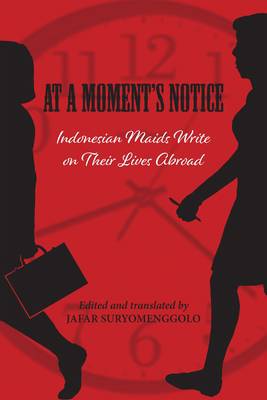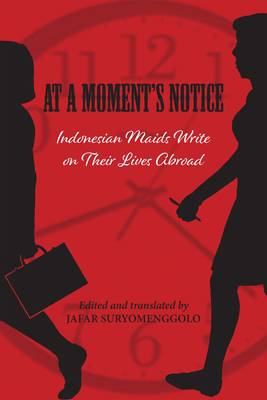
En raison d'une grêve chez bpost, votre commande pourrait être retardée. Vous avez besoin d’un livre rapidement ? Nos magasins vous accueillent à bras ouverts !
- Retrait gratuit dans votre magasin Club
- 7.000.000 titres dans notre catalogue
- Payer en toute sécurité
- Toujours un magasin près de chez vous
En raison de la grêve chez bpost, votre commande pourrait être retardée. Vous avez besoin d’un livre rapidement ? Nos magasins vous accueillent à bras ouverts !
- Retrait gratuit dans votre magasin Club
- 7.000.0000 titres dans notre catalogue
- Payer en toute sécurité
- Toujours un magasin près de chez vous
At a Moment's Notice
Indonesian Maids Write on Their Lives Abroad
111,95 €
+ 223 points
Description
Life abroad for Indonesian women hired as domestic workers is more than the job. In their spare time, some will plan a better life back home when their work contract ends. Others will venture out to experience the cities (like Singapore, Hong Kong and Taipei) where they now work, even posing as locals and living life to the full. And some of these women write.
In recent years, a new genre of Indonesian women's literature has developed, one in which--often in short stories--authors reimagine their experiences as domestic workers in foreign lands. Now, for the first time, a selection of these stories has been collected and translated into English. Collectively, these stories provide an honest description of the complex and multifaceted reasons for working abroad, the maids' living and working conditions, and their hopes and dreams for a better life. The stories are also a delightful read. The anthology can be read, enjoyed and understood in different ways. For the many middle-class employers of such maids, the stories offer startling insights not just into the thoughts of their sometimes infuriating staff but also the culture and experiences that guide them. For scholars engaged with labour migration (now a global industry), the stories give colour and nuance to their ethnographic data and a voice to their subjects not always available. And for those working in literary fields, the value of this collection is immediately obvious. It opens a space for dialogue between such workers and their readers who may be unaware of their literary products. Beyond that, it brings to fore the discussion on literary/cultural production by female workers from developing countries; fiction/short stories become an important medium for the working class to express their life, thoughts and feelings. These non-Western texts also may cause some to rethink their understanding of World Literature. But whatever their background, readers of this lively collection will be moved, amused and even maybe horrified by these thought-provoking stories of life at the end of the vacuum-cleaner in modern Asia.Spécifications
Parties prenantes
- Editeur:
Contenu
- Nombre de pages :
- 208
- Langue:
- Anglais
- Collection :
Caractéristiques
- EAN:
- 9788776942700
- Date de parution :
- 01-07-19
- Format:
- Livre relié
- Format numérique:
- Genaaid
- Dimensions :
- 155 mm x 231 mm
- Poids :
- 498 g

Les avis
Nous publions uniquement les avis qui respectent les conditions requises. Consultez nos conditions pour les avis.





